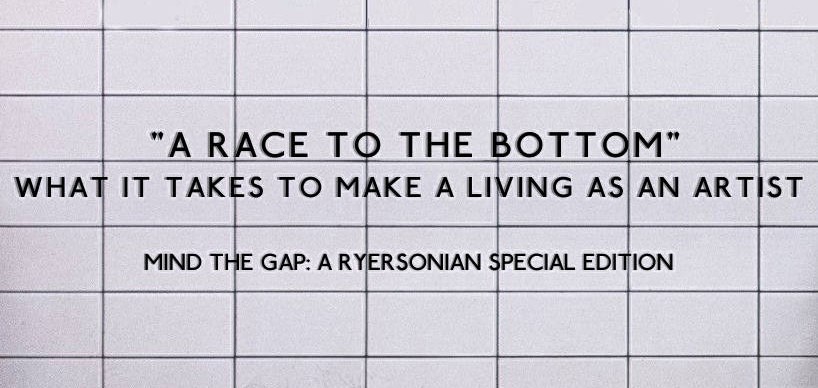Many Ryerson artists believe they have to hustle if they want to make it in their fields

After discovering an unexpected love for the art of photography, Jordana Petruccelli started shooting professionally when she was 16.
Petruccelli took her craft from a hobby to a business before going to university to study photography. For the fourth-year Ryerson image arts student, getting a formal education in the craft seemed like the logical next step. At the time of her enrolment, Petruccelli wasn’t so worried about the idea of being employed in her field after graduation.
“I didn’t really question anything,” she said. “It felt like a natural thing to be doing.”
Armed with the influence of parents who work in business, Petruccelli felt like she understood how to start and grow a business. Although turning her passion into a profession seemed like a natural progression, it wasn’t until her first year of university that she started to see the competitive nature of the arts industry and the difficulty of making a full-time living from it, rather than doing it for extra cash while in high school.
“It becomes a race to the bottom,” she said. “There are photographers that will undercut other professionals on purpose with discounts and deals.”
Petruccelli’s business mainly focuses on portrait photography. She still does creative photography out of enjoyment, but even between her professional work and hobby shoots, often feels like she isn’t doing enough.
“There have been days where I’ve finished my work day and checked everything off my list, but I feel like I have to do more work when I don’t,” Petruccelli said. “I shouldn’t because I’ll burn myself out.”
“Hustle culture” is a phenomenon that has not only affected Petruccelli but many artists’ self-image. It’s the idea that people should always be working and should be loving it, according to an article by The New York Times. The newspaper and others have criticized the concept of hustle culture because of its detrimental effects on mental health, which in part come from an unhealthy link between worth and productivity. Still, artists tend to buy into the phenomenon and end up suffering because of it.
Hustle culture is driven by an incorrect notion that those who are constantly busy will see instant results, said Ryerson psychology alumnus Joey Florence, who is currently applying to a master’s program in his field of social psychology.
“It’s actually a really big myth because it’s the complete opposite,” Florence said. “Being too busy can actually cause sleep problems, which then relates to being less efficient, less focused and less productive.”
Florence, who is a multi-instrumental musician himself, said artists have particular challenges with hustle culture because of the difficulty of making a living in the arts.
Because productivity and an artist’s level of success play a role in their sense of self-worth, it can be easier for them to feel like they aren’t really doing anything. Florence said the reason so many people buy into hustle culture is because of a tendency to compare themselves to others.
“You think ‘wow, they’re hustling, so that means they’re better because the opposite of hustling is laziness, and if I’m not hustling, I’m lazy,’” he said.
Harrison Clark, a fourth-year film studies student at Ryerson, is focused on making his dream to be a filmmaker a reality despite dealing with a competitive job market. Even if he has to take a day job and make his own films on the side, he said it’s important that his day job still be in film.
“It would be kind of a waste of time to have done all this and not go into film as a career,” he said.
Most arts-driven careers are difficult to make a living in. A 2016 profile of the Canadian workforce found that the median income for artists is only $24,300 a year, 44 per cent lower than the national average of $43,500.
Alongside his filmmaking career, Clark has a hobby creating glitch art, a style of art where digital tools are used to corrupt and distort a photo, sometimes creating an entirely different picture.
Hobby artists are not exempt from feeling the pressures of hustle culture. Clark says many artists feel like each piece of work they make should do something to push themselves further in terms of recognition and acclaim, which can take away some of the enjoyment.
“When you’re making stuff, you’re hoping you’re (going to) make the next big thing or what you’re making is gonna help you get your next job,” he said. “There’s always this thought in the back of your head, even if you’re trying not to think that.”

Vicky Wang, who goes by Earlybird professionally, is a Ryerson creative industries alumna who has a passion for making music.
“It’s only when it’s forced that it becomes a chore,” she said. “It definitely drains the life and love out of it.”
Wang aims to build a career making music full time, but is careful to only create the music she’s passionate about and not set counterproductive goals, like writing a song every day.
“I always come back to the why of what I’m doing,” she said.
Despite dialogue about the harmful nature of hustle culture, artists still buy into the idea because of how it works on an individualistic level, said Florence. Because the idea is perpetuated by people comparing themselves to others, the pressure to constantly work comes from the individual, he explained.
“The individualistic culture has the idea that we need to strive for personal achievement and to stand out from the crowd,” Florence said. “Whatever we do, we want to be the best of the best.”
